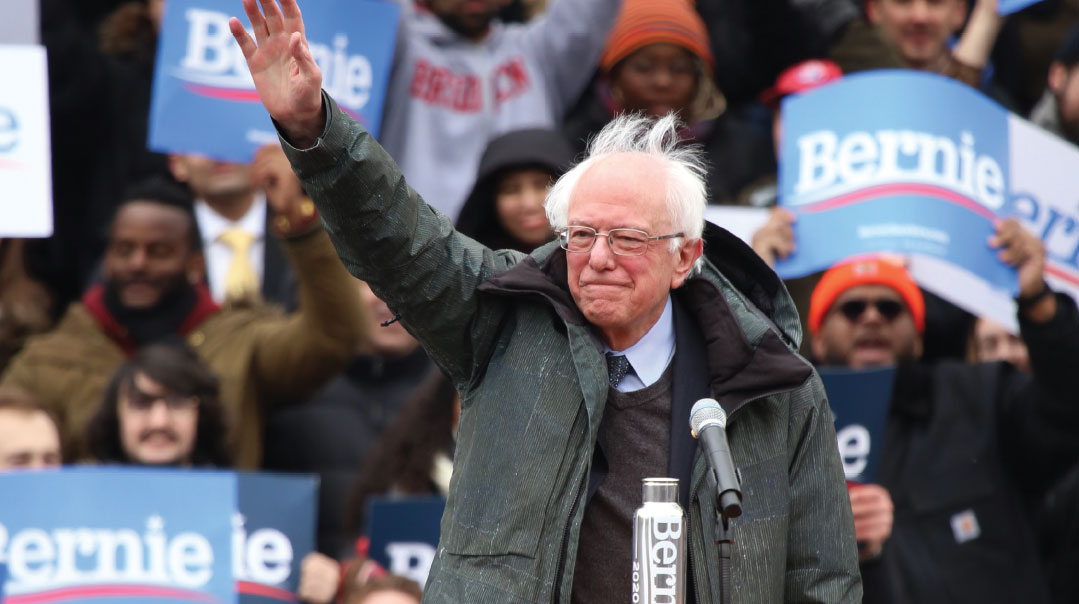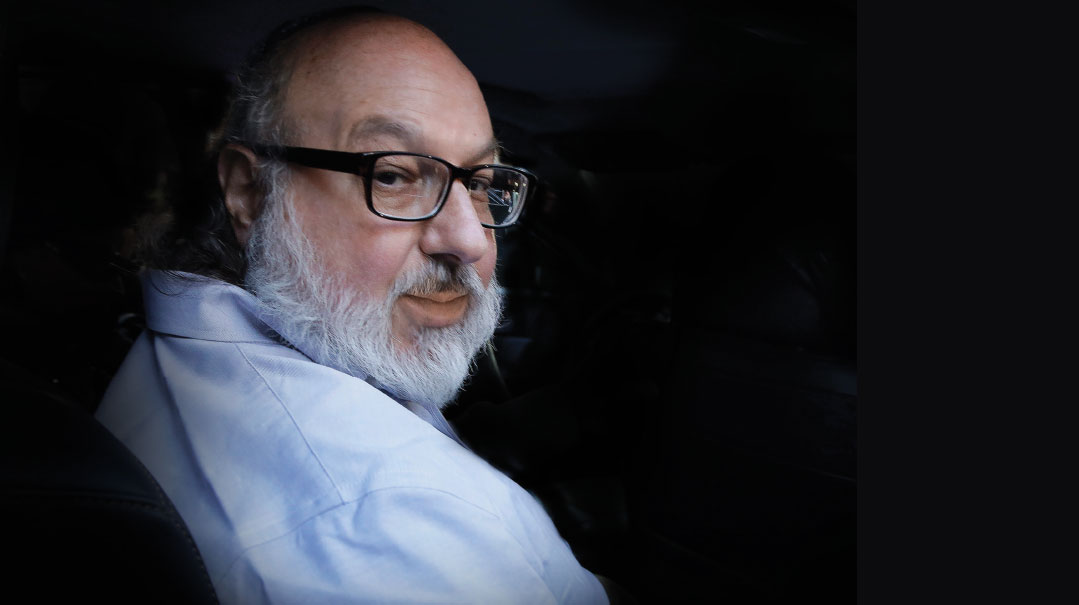America Is Feeling the Bern

A socialist from Vermont is on his way to capturing the Democratic nomination for president. What has led to his remarkable rise?

A Special Mishpacha Report. Project coordinated by Gershon Burstyn
For years, Bernie Sanders was a curiosity. A socialist from Vermont sitting in the US House of Representatives, he waged a lonely crusade for the working man for eight terms.
Then, Senator Bernie Sanders — he won election to the upper house in 2006 — shocked the world by nearly besting Hillary Clinton in the 2016 Democratic primaries. If not for some power politics at the Democratic convention that year, it could have been Sanders vs. Trump.
And now we find Bernard Sanders, son of Eli Sanders and Dorothy Glassberg, absolutely tearing up the Democratic primaries. He tied for first place in Iowa, won New Hampshire, dominated his opponents in Nevada, and is nationally nearly ten points ahead of his closest rival, presumptive front runner and former vice president Joe Biden. There’s a real chance that Bernie Sanders, proud democratic socialist who still advocates for the working class in Marxian tones, will represent the Democratic party in a national election versus Donald Trump.
Sanders has made no secret of his socialist tendencies. He chose to honeymoon in the Soviet Union in 1988, shortly before the demise of the Communist regime. When he returned, he praised that country’s transportation system and its “palaces of culture.” He also visited Nicaragua in 1985, where socialist revolutionaries led by Daniel Ortega had overthrown the government. He later said he was “impressed” by that country’s leaders, who would turn Nicaragua into the Western hemisphere’s second poorest nation.
But with his thick Brooklyn accent (he grew up in Midwood) and unapologetic style, the 78-year-old Sanders has created an energetic campaign, especially for young voters and celebrities, who admire his dedication to progressive causes and sense an authenticity lacking among his rivals.
What does it mean to be a democratic socialist? In 2018, a member of the party told Vox that “democratic socialists want to end capitalism. And we want to do that by pursuing a reform agenda today in an effort to revive a politics focused on class hierarchy and inequality in the United States. The eventual goal is to transform the world to promote everyone’s needs rather than to produce massive profits for a small handful of citizens.”
Donald Busky, author of Democratic Socialism: A Global Survey, writes that “the majority of democratic socialists are evolutionary socialists — seeking a very gradual transition to socialism, leaving most industries for the time being in the hands of private capitalists.”
Rep. Alexandria Ocasio-Cortez, author of the radical Green New Deal, is a democratic socialist. So is Rep. Rashida Tlaib, the Democrat from Michigan who has made her opposition to Israel a cornerstone of her tenure.
Indeed, among all the democratic contenders, Sanders is the most pro-Palestinian. He calls the Netanyahu government “right wing and racist” and calls for “justice” for the Palestinian people. In 2014, he said Israel’s use of force during Operation Protective Edge was “disproportionate” and “indiscriminate.” Though he formally opposes the boycott movement against Israel, in 2019, he opposed legislation that made it easier for states to shut down boycott campaigns.
Some have said that democratic socialists want to make the United States more like Sweden, where capitalism still exists, but wealth is more evenly distributed through high tax rates and universal distribution of government services. But in truth, Sweden, and countries like it, are better defined as social democracies.
Democratic socialism falls somewhere between the Swedish model and the pure socialist model. Sanders himself says that he is simply pursuing the agenda that President Franklin Delano Roosevelt inaugurated in 1945 with the New Deal. To accomplish that goal, Sanders told the New York Times in June 2019 that “we have to combat oligarchy and the incredibly unfair and unequal distribution of wealth and income, and to take on the incredible political power that the one percent have.”
Toward that end, Sanders advocates for a universal health care system, free college tuition, federal protections against the firing of employees, eliminating the $81 billion in medical debt held by 79 million Americans, and raising $4 trillion in federal revenues by halving the wealth of billionaires over the next 15 years.
Critics claim that Sanders and Sen. Elizabeth Warren, who supports similar policies, are living in a dream world. Where exactly is the money going to come from in a country that is already $22.7 trillion in debt? And wouldn’t their scheme mean remaking the very fabric of the United States, a country where income is verifiably distributed unevenly, but is also the wealthiest and most successful country that has ever existed?
But for 40 percent of Americans, the introduction of socialist policies is apparently desirable. A 2019 Gallup poll found that four in ten Americans say “some form of socialism” would be a “good thing,” 18 points higher than in 1942, when F.D.R. was sitting in the Oval Office.
So Sanders seems to have found a vein of discontent in the American electorate. The United States is minting new millionaires daily, but too many people have seen their wages stagnate. Health care costs are out of control, and it’s not hard to find a family member or friend who has paid outrageous fees for prescription drugs or hospital stays. Young adults are graduating college with huge debts and few prospects.
To untangle the phenomenon of Sanders’s growing appeal, we invited six commentators to answer several questions on the Sanders wave. If Sanders is indeed the nominee, American voters should take time to consider his policies seriously.

Q:
This seems to be Bernie Sanders’s moment. His message hasn’t changed — he’s been remarkably consistent for a politician, sticking to the same vision for decades — but suddenly there’s a generation out there that’s receptive to the message. What has changed?
Mark Penn: It is a surprising Sanders moment. While he is an avowed democratic socialist, he is also known to younger voters as a champion of free college. The combination of that anchor, his personality, and his perseverance has made him the favorite despite his views on the issues. A lot of his voters are voting for him despite his socialist views instead of because of those ideas.
Steve Rabinowitz: Nothing. Except that suddenly — well, several months ago — Bernie has embraced his Jewish identity. He finally stopped describing his grandparents as Polish. Hey, Bernie: They were Jewish all along! On their official Polish national ID cards and passports, under nationality, it said “Jewish.”
Michael Fragin: The electorate is more polarized than ever. Just as Republicans have moved away from the center, so have many Democrats. There is an antiestablishment theme that you see among his supporters. He has benefited from being viewed as ideologically pure and uncorrupted.
People have this idea that everything is broken, and we need someone who is not part of the system to fix it. I don’t think that core message will resonate with the electorate, but he doesn’t need a majority of the Democratic primary voters to win. Just as in 2016, when Donald Trump benefited from a strong base of hard-core supporters in a fragmented Republican primary, Sanders has the same dynamic against a fragmented “moderate” Democratic Party wing.
David Greenfield: Bernie’s message resonates exactly because he’s been saying it for so long. In an age in which politicians will change their talking points depending on their audience, he attracts voters because he’s authentic. That, plus he is as antiestablishment as you can get. If you hate the way things are, supporting Bernie is the ultimate stick in the eye to the current establishment.
Binyamin Rose: I’m not sure the change is so sudden. America always had pockets of “utopian” communities in the 19th century, and socialism was attractive to many Americans in the pre-World War II era, especially after the Roaring Twenties gave way to the Great Depression. Bernie Sanders was a child of that era.
That explains him, but what drives his supporters? History repeats itself. It’s only a little more than a decade since the housing and financial market meltdown wreaked the worst economic havoc on the world since the Depression. The big financial institutions Sanders rails against were seen as the culprits, along with a government and the Federal Reserve complicit in bailing them out at the expense of average Americans who lost their homes. Many young Sanders voters came of age in this era and blame Wall Street, billionaires, or Big Pharma for ripping off the public. Sanders’s proposals for free college education, cheap medical care, and income equality resonate with the new crop of voters who came of age in 2016 and 2020.
Zachary Schrieber: I don’t think anything has truly changed. The inherent structural problems of capitalism that Bernie has identified, including increasing concentrations of wealth and a focus on profits over people, have been present for generations. These problems have gone unchecked, under complicit administrations from both parties, and are now reaching their natural boiling point. So there is currently an electorate receptive to a message because it is recognizing the issues Bernie has been talking about for decades and realizing that his solutions are the correct ones to address those problems.
Q:
So many countries that have implemented socialist policies have seen their systems fail, usually with the citizens paying a heavy price. Why do the Bernie enthusiasts think he holds the solution when that solution has been proven to be so flawed?
Mark Penn: Most young voters in America today, believe it or not, favor socialism over capitalism. However, socialism is clearly rejected by two-thirds of all American voters, so these young people are out of step with the country.
In reality, they have no real understanding of socialism beyond free stuff. It is remarkable how our educational system has failed us — or perhaps has achieved the outcome that many in the system sought. You need go no farther than Venezuela to see how the socialist system there fell off the rails and impoverished the masses rather than enriching them.
David Greenfield: He doesn’t advocate pure socialism — he advocates “democratic socialism” — and that difference attracts many people. The concepts of free health care, free college, and taxing the rich sounds very appealing on its face. It’s even more appealing to younger voters who didn’t grow up observing true socialist countries in action and don’t know how citizens suffered under those authoritarian regimes.
Zachary Schrieber: Americans are already paying a heavy price, both literally and figuratively, for a failed system — the one we currently have. Affordable higher education and universal taxpayer-funded health care have proven to be quite successful in many major countries, including Western allies like England, Canada, Israel, and the Nordic states. These are countries that have massive public investment in education and health care, take climate change seriously, have high quality senior-care and parental-leave policies, and are all thriving Western democracies with stronger quality of life and longer life expectancies than we currently have in the United States. We are living in a country where the top 1% of the population owns more wealth than the bottom 90%, but students are saddled with debt for their entire lives merely because they wish to pursue a profession that demands longer schooling, and innocent people are faced with the choice of amassing crippling levels of medical debt or risking their own health because they cannot afford proper medical care. Bernie is offering new, bold, and sincere solutions to these problems, and young people are the ones most receptive to his bold messaging.
Michael Fragin: His supporters make this false parallel with democratic socialism in Scandinavia and think that it would work here. How can you compare the US to Sweden? I don’t think people are actually saying we should become Communist Russia; they are saying we want to be more like Sweden and Norway where college is free and there is a universal income. I don’t think people understand the extent of Sanders’s agenda. A lot of people who are opposed to Sanders are union members, because they want to keep their gold-plated insurance.
Steve Rabinowitz: I think too much is being made of Bernie being a socialist. He is a socialist and readily admits it, but he’s running as a Democrat. The socialist party in American has virtually not existed for almost 100 years. Bernie supporters no more consider themselves socialists than do modern Israelis who support government health care and still work for the Jewish Agency.
Binyamin Rose: Voters aren’t eyeing the flawed socialist societies. They’re looking at the success stories. No normal American wants to emulate Cuba or Venezuela but they wonder why America can’t be more like Norway, Sweden, and Denmark. What they don’t realize is that these countries have “hybrid” economies, where social benefits are fueled by strong, free-market economies, a productive workforce that earns high salaries and can afford the higher taxes to pay for their goodies. People also forget that Norway is a small, homogeneous country of 5.5 million people. Most people share a similar ethnic background and worship in the same church. It’s a major stretch to think their system will work with America’s melting pot of 330 million people, but Sanders supporters will tell you America has the money to do this too if they could only loosen the clasp of the billionaires and change spending priorities.
Q:
How closely is Bernie’s appeal connected to the younger generation’s sense of entitlement? How much is connected to the outrage/blame culture? How much is due to their exposure to the campus diet of dominantly leftist thinking?
Steve Rabinowitz: I think young people today do feel at least a little entitled. My father a”h thought the work ethic of his day was gone from my generation. Well, it’s a thing of the distant past these days. But I don’t blame Bernie in the least. Is he playing to it? Sure. Does what he has said all these years resonate with them? Absolutely. They’re made for each other. But I think it’s a natural constituency for the most part and something we should all learn from and be less scornful of — even if I’m not down with it.
Mark Penn: Our educational system is failing to provide intellectual and ideological diversity, and it is critical we increase that to give students a complete picture of history and social science.
Michael Fragin: If I’m young and nervous about the future, I’m very happy to get free things. Free college and health care sounds pretty good until someone has to pay for it.
Binyamin Rose: There is no question that the atmosphere on college campuses can be poisonous. On the stump, Sanders’s posture is one of outrage and fist-pounding. But I would attribute his appeal among the younger generation to something totally different. This is the age of Greta Thunberg, where youth have been fed the storyline that the world is under a threat of impending doom — from climate change, cyber warfare, or even giant meteors crashing into the Earth. A voter who believes in Apocalypse Now is much more likely to grasp at a candidate offering radical solutions.
Zachary Schreiber: It’s not connected at all. Many of the policies Bernie advocates have little to do with entitlements for younger people. Increasing social security benefits will help older people and retirees. His proposals for universal taxpayer-funded health care will also benefit older people, who rely on medical care far more than younger people. Additionally, poll numbers show that Bernie receives a higher share of non-college educated voters than he does from college educated voters, indicating that his appeal extends well beyond those who have spent years exposed, in your words, “to the campus diet of dominantly leftist thinking.”
Bernie’s appeal is found in his message of compassion and support that we must have for each other. This is an idea well understood in the Jewish community. Bernie is fighting against viewing the world through the prism of profit and is championing a world where people find commonality and solidarity with each other through our shared hardships and vulnerabilities. You can only really begin to understand this if you actually watch him speak, or attend a rally, as opposed to having his message filtered through for-profit media, both on the right and left side of the aisle.
Q:
Is there some substance to the claims of Sanders’s voters? Has capitalism, or at least the 2020 American version of capitalism, failed large swaths of young America? Can the average young American reasonably expect to be able to make a living, buy a home, and support a family in America today? Does the data support that frustration?
David Greenfield: The short answer is yes. Met Council on Jewish Poverty is a recipient of highly-competitive Robin Hood Foundation funding. Last week, I participated in a conference on poverty that Robin Hood sponsored. Their newest research shows that 50% of New Yorkers lived in poverty sometime during the last five years. That’s astounding.
Research also shows that millennials earn on average 20% less than Baby Boomers did at their age and have a quarter of the assets that Baby Boomers had. Add to that huge college debt and skyrocketing housing costs, and you can understand why campaign slogans like “cancel student debt” and “affordable housing for all” are very appealing.
Michael Fragin: Competition is good for society. Capitalism works and has worked.
Mark Penn: You would have expected the Sanders moment to be in 2009 when capitalism failed and ten million people were out of work. Today we have full employment, wages rising, and over 75 percent see the economy as strong. Only 22 percent express unhappiness with their economic condition, far lower than a few years ago. That’s why few believe Sanders, if nominated, can win, though stranger things have happened.
Steve Rabinowitz: Absolutely. Young people who follow him have plenty to feel exercised about. We’re spending them into future debt (and that was before Donald Trump took over); the world is a mess (and that was before Donald Trump took over); and if I may get parochial, as Jews and lovers of Israel, anti-Semitism is back and relations between Israel and the Palestinians are worse than in a long time (and that is all since Donald Trump took over).
Zachary Schrieber: The problem is not just younger people looking at a poorer quality of life than that of their parents’ generation. It is also older people, as well, who are facing delayed retirement or a retirement that does not allow them to live in dignity. The Orthodox Jewish community is in many ways shielded from the problems that working class Americans face, for two basic reasons. First, we tend to live in large cities and states that have public investment in a social safety net for people who are vulnerable and suffering. Second, we ourselves have communal safety nets that are designed to help those in need. But most of the country doesn’t have that. Imagine our community existing without Tomchei Shabbos, Hatzolah, Project Ezrah, or any of the dozens of organizations specifically designed to address communal hardships. The rest of the country has those very same problems but no community through which to protect them. Bernie wants to ensure that the rest of America has the same social support that those of us in the Orthodox community do.
Binyamin Rose: One of the first rules I learned in college economics was the age-old debate between “guns or butter.” Sober pundits have long decried spending billions of dollars on weapons that (hopefully) will never be used. Sure, you can argue the arms race brought down the Soviet Union, but today, the average Sanders supporter worries more about becoming a victim of a mass shooting than getting nuked by North Korea or Iran. Many Sanders supporters feel that America has wasted billions that would have been far better spent improving America’s highways, hospitals, and housing.
As to capitalism, most people don’t see they are going to strike it rich unless they win Powerball. If you’re a young, blue-collar worker making “15 bucks an hour,” as Sanders might say, why does your boss deserve to be a millionaire, or worse, a billionaire? Even white-collar, Silicon Valley workers who make decent money are flocking to Sanders because they know they will never become the next Bill Gates or Steve Jobs. While capitalism is still a system that rewards those with initiative and “mazel,” it’s a scary climb up the ladder, requiring one to be a slave to their careers.
Q:
If there are indeed significant flaws with the current capitalist model, including or not limited to the one-percent billionaires, are there more moderate and less dramatic solutions than those Bernie stands for? Why or why aren’t they being discussed?
Binyamin Rose: I can recall three sober-minded comprehensive plans put forward to Congress in the past dozen years that included cutting debt, tax reform, and tweaking America’s spending priorities, which were all designed to make the whole system fairer. The Simpson-Bowles Plan. The Domenici-Rivlin Plan. Paul Ryan’s Path to Prosperity. All were “dead on arrival” as the saying goes, mainly because no politician will get reelected after cutting popular social-welfare programs or raising taxes to pay for them.
All of the above were introduced when there was at least a modicum of bipartisanship left, but that ship has sunk, so the radical solutions that Bernie Sanders offers has a lot of people jumping at the bait.
Steve Rabinowitz: Why present this as a choice only between those two alternatives?
I appreciate what a phenomenon Bernie Sanders is, but we shouldn’t be so obsessed with his socialist identity. Donald Trump is — but only because he is chomping at the bit to use it against Sanders if he should become the Democratic Party nominee. Trump believes the term “socialist” carries with it some old Soviet-style stigma that American swing voters will find alienating.
Trump should be so lucky. The election will likely swing on much more than who is the true socialist and who the true capitalist. It’s also a lot at this point to predict that Bernie Sanders will be the Democratic Party nominee. But if by some (non)-Divine intervention he should become so, I will join my friends [media commentator] Joel Rubin and [Sanders’s foreign policy chief] Matt Duss and the children of far too many of my other friends and support him.
Zachary Schrieber: There are definitely less dramatic solutions, and they are being advocated by the other Democratic candidates, as well as the Republican Party. But these types of incremental policy changes — slight increases in the minimum wage, Obamacare instead of Medicare for All, targeted investment in green energy instead of a reimagining of an energy sector without any fossil fuels — have been advocated by Democratic administrations for decades with very little substantive change. What we are starting to see, though, on both sides of the aisle, is a recognition that the average American is currently getting a raw deal and there is a need to think big and strive for transformational change.
Bernie has thought big, and identified what will need to be done to ensure that average Americans can succeed. Remember, capitalism is excellent regarding certain things, but terrible at others. Could you imagine advocating that the police, fire department, or military should be run with a profit motive, through a capitalist structure, instead of through the government? Could you imagine if students were turned away from yeshivah because they could not afford an increase in tuition, or if families could not attend shul because they could not afford annual membership contributions? If you do believe that, Bernie is not going to be your candidate. But if you recognize that certain aspects of society should not be subject to the profit motive and that certain services should be provided to all citizens regardless of wealth or income levels, then I think you will begin to see why Bernie may just be the candidate you never knew you would end up supporting.
Michael Fragin: Every model has flaws. Democracy has flaws. Are we saying that we should move away from that model? Of course not. We need less government intrusion on our lives and economy, not more.
David Greenfield: There certainly are moderate and practical solutions, and those are perhaps best personified by Michael Bloomberg, Pete Buttigieg, and Joe Biden on the Democratic side. The challenge is that they are not as neat as Bernie’s proposals. For example, Bloomberg would cancel student debt for “most,” not “all.” Buttigieg would provide free health care for the “uninsured” but not “everyone.” Biden would create better jobs for “the middle-class” but not “all classes.” Real change, like real life, is not neat but is in fact complicated. However, that’s not as appealing or easy to understand. Nobody likes complicated.
The encouraging news is that if you add up the support of Bloomberg, Biden, Buttigieg, and Klobuchar, it adds up to a majority of the Democratic party, and those are moderate Democrats. The challenge to them is that the single most cohesive “bloc” are Bernie supporters, and he consistently wins a plurality of votes in the polling and primaries. —
(Originally featured in Mishpacha, Issue 800)
Oops! We could not locate your form.













